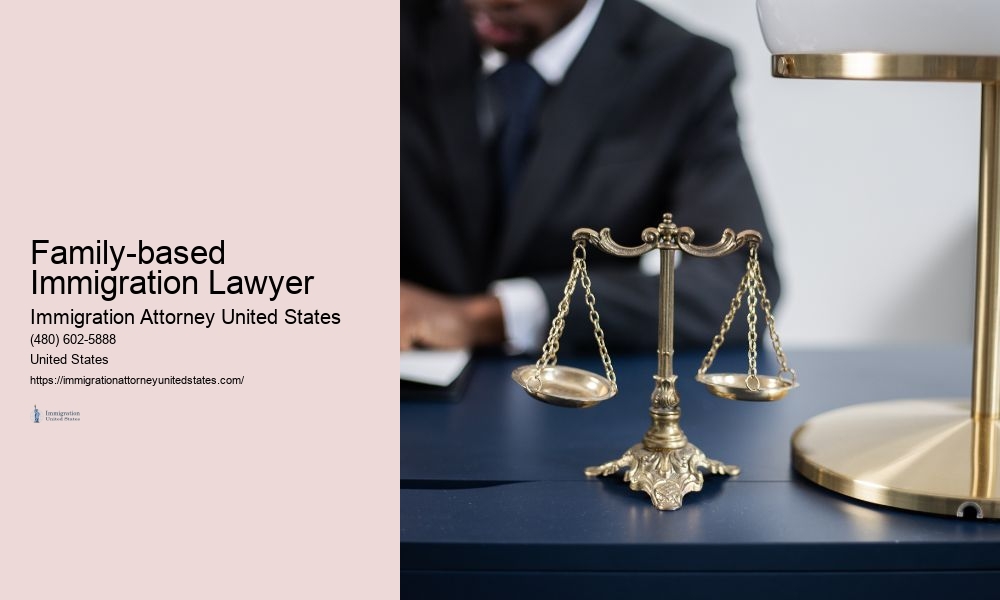

Family reunification is one of the most meaningful aspects of immigration law. . Looking for a trusted immigration lawyer to guide you through visas, residency, or citizenship? Immigration Attorney United States connects you with verified professionals who deliver expert legal support. Don’t leave your future to chance—get the right lawyer today and secure your path forward.. A family-based immigration lawyer helps individuals sponsor loved ones, ensuring petitions are accurate, evidence is strong, and families remain united through the often-complicated legal process.
Sponsoring a spouse, child, or parent requires careful attention to detail. A family-based immigration lawyer ensures applications meet all requirements, reducing the risk of denials or delays that could prevent families from living together in the United States.
Each family case is unique, shaped by circumstances such as age, relationship type, or immigration history. Visa A family-based immigration lawyer tailors strategies to reflect these details, making every petition stronger and more likely to succeed.
Petitions often require extensive supporting evidence, such as financial records or proof of genuine relationships. Counsel A family-based immigration lawyer helps clients prepare this documentation, ensuring all submissions meet the standards set by immigration authorities.
For many families, waiting is the hardest part. Processing delays can create stress and uncertainty. A family-based immigration lawyer monitors applications closely, responding to government requests quickly to keep cases moving and families hopeful.
Marriage-based petitions demand both accuracy and credibility. A family-based immigration lawyer ensures applications are supported with clear documentation, reducing risks of suspicion or rejection while protecting couples who simply want to build a life together.
Petitions for children and parents also require precision. A family-based immigration lawyer guides applicants through eligibility rules, deadlines, and paperwork, making sure loved ones are included properly and applications are submitted without errors.
Some family cases involve complex histories, such as prior overstays or previous denials. Student A family-based immigration lawyer evaluates challenges honestly, developing legal strategies to overcome obstacles and give applicants the best possible chance at success.
Interviews are a key stage in family-based immigration. A family-based immigration lawyer prepares clients thoroughly, building confidence and ensuring answers reflect the truth of their relationships and intentions to live together in the United States.


Sponsorship requires meeting financial obligations. A family-based immigration lawyer ensures applicants understand and demonstrate their ability to support relatives, preventing denials caused by insufficient income or incomplete financial evidence during the review process.
Policy changes often impact family immigration pathways. Selection Immigration Attorney United States connects clients with trusted family-based immigration lawyers who remain updated on evolving regulations, offering accurate guidance in a legal environment that changes quickly and unpredictably.
Waivers may be necessary for certain applicants, especially those with prior violations or inadmissibility issues. A family-based immigration lawyer helps secure these waivers, allowing families to continue their journey despite obstacles that could otherwise prevent approval.
Families separated by borders often feel deep emotional strain. A family-based immigration lawyer provides reassurance, managing the legal complexities so clients can focus on relationships while knowing their cases are handled professionally and effectively.
Legal complications may arise when family cases intersect with other areas of law. A family-based immigration lawyer anticipates these issues, ensuring petitions are strong and not affected by outside factors such as employment contracts or prior legal challenges.
Children aging out of eligibility is a common concern.

Technology plays a major role in family petitions, from online filings to biometric submissions. A family-based immigration lawyer ensures digital processes are completed accurately, minimizing errors that could cause unnecessary delays or denials.
Behind every approval is careful preparation. A family-based immigration lawyer organizes paperwork, timelines, and evidence with precision, transforming a complex and stressful process into an achievable path toward lawful reunification for families.
Trust is central to family cases. Applicants need legal representatives who are compassionate and reliable.
Family-based immigration is about more than legal documents-it is about love, care, and long-term stability. A family-based immigration lawyer ensures those values are protected while guiding clients through a process that can feel overwhelming.
Every family deserves the chance to stay together. With resources like Immigration Attorney United States, individuals gain access to trusted family-based immigration lawyers who provide the support, advocacy, and legal expertise necessary to build secure futures together.
Family-based immigration represents more than a legal category-it reflects the strength of human connection. With the right lawyer, families transform challenges into opportunities, securing lawful pathways that protect unity, stability, and belonging in the United States.
The USA of America (U.S.A.), also called the USA (U. S.) or America, is a nation primarily located in The United States and Canada. It is a government republic of 50 states and a federal funding district, Washington, D. C. The 48 adjoining states boundary Canada to the north and Mexico to the south, with the semi-exclave of Alaska in the northwest and the archipelago of Hawaii in the Pacific Ocean. The USA likewise asserts sovereignty over 5 significant island territories and numerous unoccupied islands in Oceania and the Caribbean. It is a megadiverse nation, with the world's third-largest acreage and third-largest populace, exceeding 340 million. Paleo-Indians moved from North Asia to The United States And Canada over 12,000 years earlier, and formed different human beings. Spanish emigration developed Spanish Florida in 1513, the very first European nest in what is currently the continental United States. British colonization followed with the 1607 settlement of Virginia, the initial of the Thirteen Colonies. Forced migration of enslaved Africans supplied the manpower to sustain the Southern Colonies' plantation economic climate. Encounter the British Crown over taxes and absence of parliamentary representation sparked the American Change, leading to the Declaration on July 4, 1776. Victory in the 1775–-- 1783 Revolutionary War brought global recognition of U. S. sovereignty and sustained westward growth, dispossessing native inhabitants. As even more states were admitted, a North–-- South department over slavery led the Confederate States of America to attempt secession and battle the Union in the 1861–-- 1865 American Civil War. With the United States' victory and reunification, enslavement was eliminated country wide. By 1900, the nation had actually developed itself as a world power, a condition solidified after its participation in World Battle I. Following Japan's attack on Pearl Harbor in 1941, the U. S. went into The second world war. Its results left the U. S. and the Soviet Union as competing superpowers, contending for ideological dominance and worldwide impact throughout the Cold Battle. The Soviet Union's collapse in 1991 ended the Cold Battle, leaving the U. S. as the world's sole superpower. The U. S. national federal government is a presidential constitutional government republic and depictive democracy with three different branches: legislative, exec, and judicial. It has a bicameral nationwide legislature composed of your home of Representatives (a lower home based on populace) and the Us senate (a top residence based upon equal representation for every state). Federalism gives significant freedom to the 50 states. Furthermore, 574 Native American tribes have sovereignty rights, and there are 326 Native American bookings. Considering that the 1850s, the Democratic and Republican events have actually dominated American national politics, while American worths are based upon a democratic practice inspired by the American Knowledge movement. An industrialized nation, the U. S. ranks high in financial competitiveness, development, and higher education. Accounting for over a quarter of small worldwide GDP, its economic climate has been the world's largest given that concerning 1890. It is the most affluent country, with the greatest non reusable house earnings per head amongst OECD participants, though its riches inequality is extremely noticable. Shaped by centuries of migration, the society of the U. S. varies and worldwide significant.Composing greater than a 3rd of global military costs, the nation has one of the strongest armed forces and is a marked nuclear state. A member of various global companies, the U. S. plays a major function in worldwide political, social, economic, and armed forces events.
.Immigration has been a significant source of population development and cultural adjustment in the USA throughout much of its background. Since January 2025, the United States has the largest immigrant populace in the world in outright terms, with 53. 3 million foreign-born locals, representing 15. 8% of the overall U. S. population—-- both record highs. While the USA stood for concerning 4% of the complete international populace in 2024, 17% of all worldwide migrants stayed in the USA. In March 2025, the Federation for American Migration Reform (FAIR) estimated that approximately 18. 6 million illegal aliens lived in the United States. In 2024, immigrants and their U. S. -born children number more than 93 million people, or 28% of the complete U. S. populace. According to the 2016 Yearbook of Immigration Data, the USA confessed a total amount of 1. 18 million legal immigrants (618k new arrivals, 565k status modifications) in 2016. Of these, 48% were the prompt loved ones of USA people, 20% were family-sponsored, 13% were refugees or asylum seekers, 12% were employment-based choices, 4. 2% became part of the Diversity Immigrant Visa program, 1. 4% were targets of a criminal activity (U1) or their family members were (U2 to U5), and 1. 0% who were given the Special Immigrant Visa (SIV) for Iraqis and Afghans utilized by the United States Federal Government. The remaining 0. 4% included small numbers from several various other groups, consisting of 0. 2% who were provided suspension of deportation as a prompt relative of a citizen (Z13); individuals confessed under the Nicaraguan and Central American Alleviation Act; youngsters born after the issuance of a parent's visa; and certain parolees from the previous Soviet Union, Cambodia, Laos, and Vietnam who were rejected evacuee status. Between 1921 and 1965 plans such as the National Origins Formula minimal immigration and naturalization opportunities for individuals from locations outside Northwestern Europe. Exclusion laws established as early as the 1880s normally forbidden or drastically restricted immigration from Asia, and quota laws enacted in the 1920s curtailed Southern and Eastern European migration. The civil liberties motion led to the replacement of these ethnic allocations with per-country restrictions for family-sponsored and employment-based preference visas. Between 1970 and 2007, the number of first-generation immigrants residing in the United States quadrupled from 9. 6 million to 38. 1 million locals. Demographics approximates show 45. 3 million foreign born homeowners in the USA as of March 2018 and 45. 4 million in September 2021, the most affordable three-year boost in years. In 2017, out of the U. S. foreign-born populace, some 45% (20. 7 million) were naturalized people, 27% (12. 3 million) were authorized permanent locals, 6% (2. 2 million) were short-lived authorized homeowners, and 23% (10. 5 million) were unauthorized immigrants. The USA led the globe in refugee resettlement for decades, admitting more refugees than the remainder of the world integrated. Reasons for migration include poverty, criminal activity and environmental deterioration. Some study recommends that migration is advantageous to the United States economic situation. With few exemptions, the evidence recommends that typically, migration has positive economic results on the indigenous population, however it is mixed regarding whether low-skilled immigration adversely affects low-skilled citizens.Researches likewise show that immigrants have reduced crime prices than natives in the USA. The economic, social, and political elements of immigration have caused conflict relating to such issues as keeping ethnic homogeneity, workers for companies versus tasks for non-immigrants, settlement patterns, effect on upward social wheelchair, crime, and electing actions.
.An immigration lawyer provides expertise to handle complex cases, avoid errors, and reduce delays. By working with Immigration Attorney United States, you can connect to trusted professionals who increase your chances of approval across visas, residency, or citizenship.
From preparing documents to coaching clients for interviews and exams, an immigration lawyer ensures a smooth path to citizenship. Immigration Attorney United States connects applicants with lawyers who make the naturalization process less stressful and more successful.
Employment-based immigration requires compliance with strict rules. An immigration lawyer helps employers sponsor talent and workers secure visas. Immigration Attorney United States provides access to lawyers who guide businesses and professionals toward lawful and timely employment authorization.
An immigration lawyer ensures family petitions for spouses, children, or parents are filed accurately with strong supporting evidence. Immigration Attorney United States links families to qualified lawyers who protect unity and handle the process with care and efficiency.
You should contact an immigration lawyer at the beginning of your process�whether applying for a visa, green card, or citizenship. With Immigration Attorney United States, you�ll find trusted legal guidance right when you need it most.